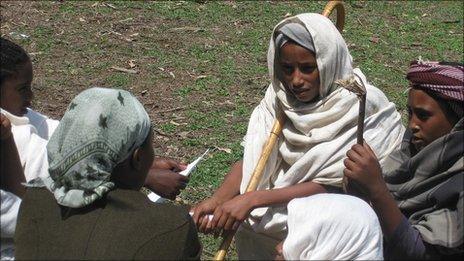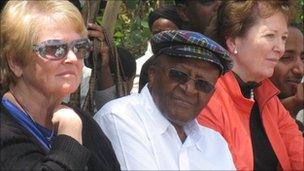Ethiopian girls fight child marriages
- Published

"I wanted to get an education but my parents were determined to marry me off," says Himanot Yehewala, an Ethiopian girl who was married five years ago at the age of 13.
"I tried to run away but my mother said she would kill herself if I did not marry him."
"I was not mature physically or emotionally so it was not easy for me to go and sleep with my husband."
She had never met her bridegroom, 18-year-old Gedefaw Mengistu, before their wedding day.
"I knew she was too young. I was in grade five but my father died and I was forced to stop school, get married and keep the family going," Mr Gedefaw told the BBC.
The couple live in Ethiopia's Amhara Region - an impoverished rural farming area where half of all girls are married before they turn 15.
"It's quite shattering to have met people who were married off," Archbishop Desmond Tutu told the BBC on a visit to the area.
"In one case the husband was eight and the supposed wife was seven. I mean you want to say it's abominable," he said.
The South African Nobel Peace Prize winner may have recently announced his retirement from public life but he is out fighting injustice again as one of the Elders - the group of eminent global leaders brought together by South Africa's former President Nelson Mandela.
"I wasn't aware of the extent of the problem - and it is just fantastic that things are taking a turn for the better and incredibly so," he said.
The archbishop was referring to the impact of government-led programmes in several dozen villages in the region which focus on delaying marriage.
Fear of abduction
In this area, the lure of a bride price causes many families to push for early weddings. But there is another reason.
"Fear of abduction is also a factor, external," said Alemseged Weldegerima from the Ethiopian government's Bureau of Women, Children and Youth Affairs.
"We will try to stop abduction, not by using the police, but by increasing the awareness of the people."
Beside a small eucalyptus plantation Archbishop Tutu was sharing a low wooden bench with two Elders who have broken the mould; the first woman to be president of Ireland, Mary Robinson, and the former prime minister of Norway, and ex-head of the World Health Organization, Gro Brundtland.
They listened to young unmarried girls with big dreams, as well as women who had no chance of getting an education after being married off at a young age.
Abay Asnakew is 12 and she has her life all mapped out.
"When I finish my high school I will join university; I'll complete my BA degree and get a job and help my family. Then if my partner has a degree too then I will marry him," she says.
"So what job do you want to do?" I asked.
"Prime minister," she replied without hesitation. Look out Meles Zenawi!, external
Abay has joined a girls' club known as Berhane Hewan - Amharic for "Light for Eve".
She has learnt about issues which have prepared her to resist early marriage; personal health, HIV/Aids, and the medical complications associated with giving birth at a young age, like fistula.

The Elders heard from girls hoping to avoid early marriage and some who had left school to marry
Female circumcision is also discussed and in the 36 villages where the clubs have been set up, I am told fewer girls are now getting cut.
Beside the road several boys are playing table football. They seem to welcome the idea of delaying marriage.
"You can't afford to run a family when you're too young," said 20-year-old Tazab, who has no plans to wed any time soon.
"Also it's bad for a girl's health to have children too early," he says.
'Undervalued'
In a rectangular mud-walled building which serves as a meeting hall and classroom for the Berhane Hewan participants, I met 15-year-old Serkaddis Assefa.
"Because of the Berhane Hewan programme I know about the issue of early marriage. If I hadn't joined, I might have been married off already," she said.
Sitting alongside was her mother, Enguday Assefa, whose forth child was fast asleep on her back.
Around Ms Enguday's neck was part of her dowry payment; a coin bearing the face of Ethiopia's last emperor, Haile Selassie, and another of Queen Taitu, wife of the monarch Menelik II who died in 1913.
"I still feel bad when I think about my friends who now have jobs and have reached different positions," said Ms Enguday, who was forced to quit school and was already married with a child by the age of 15.
For the Elders, the behavioural change which has only happened in the last five years is worth celebrating.
"When Nelson Mandela brought us together at our first planning meeting he did say to us: 'Be bold, talk to those whom others won't talk to, be on the side of the most deprived, the most isolated, the most undervalued in society,'" recalls Mrs Robinson.
"And in many ways those young girls, brides and mothers are very undervalued by their community and have very little sense of self-worth so the issue of child marriage, as far as I'm concerned, is a very good way of having an entry point into the effect of poverty.
"The effect of a lack of equality within communities, the effect of harmful traditional practices on the community - the effect of all the things that the Elders should be championing."
Berhane Hewan started off with 700 girls and at its peak reached around 12,000 - just a small fraction of the vulnerable population.
While considered to be a successful initiative, the programme will need to be scaled up significantly to make a major difference in Ethiopia.
For the first time the girls here are starting to shape their own destinies.
The hope among the Elders is that lessons from Ethiopia's Amhara Region can be applied to other parts of the world where child marriage is common, like India.
- Published22 July 2010